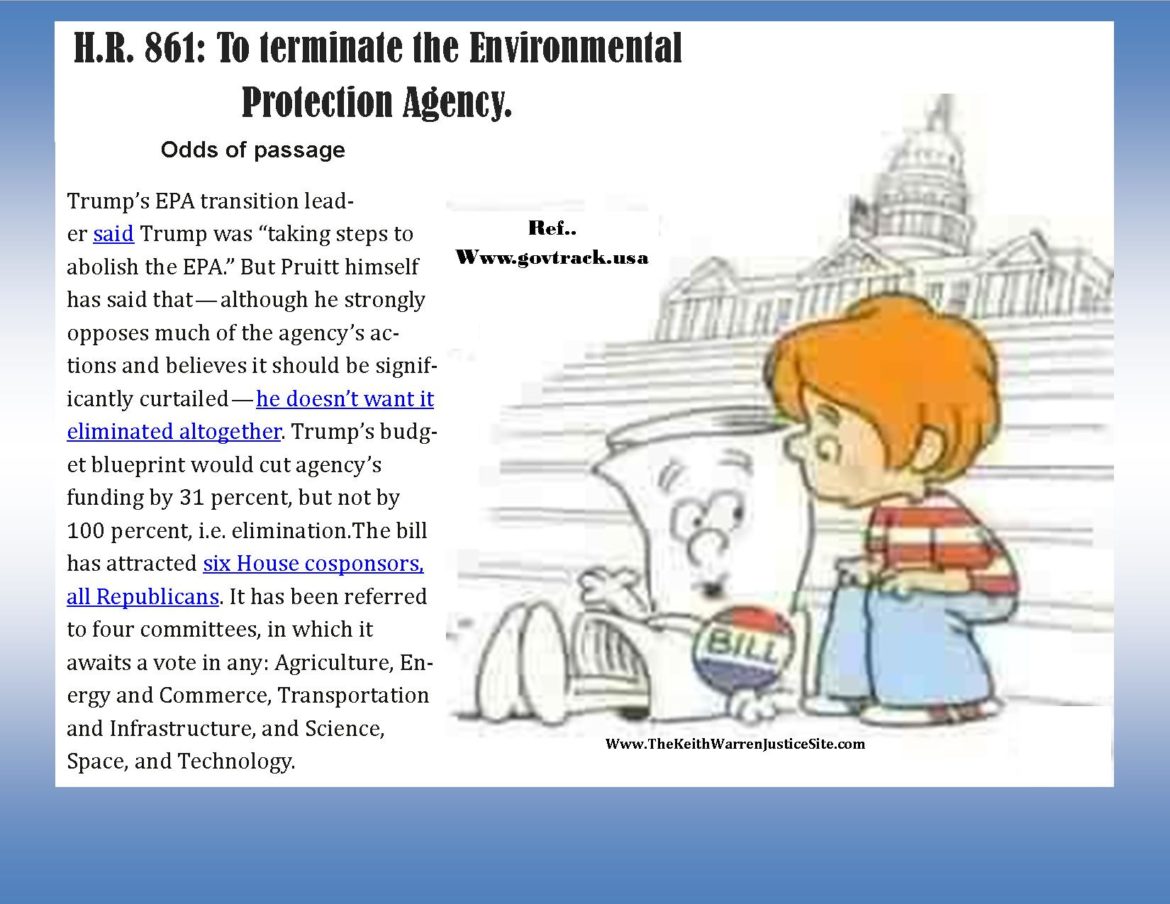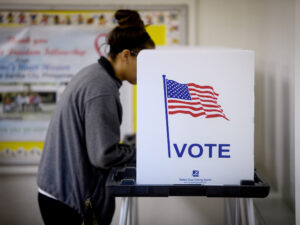
https://www.govtrack.us/congress/bills/115/hr861/summary
H.R. 861: To terminate the Environmental Protection Agency.
Library of Congress
It’s been a rough 2017 for the Environmental Protection Agency.Four days into Donald Trump’s presidency, EPA staff were banned from speaking with reporters or updating social media, as the administration delayed implementation of 30 Obama-era environmental rules. EPA’s new administrator Scott Pruitt — who remains a plaintiff in multiple suits against the EPA — saw his emails released, revealing the extent to which he cooperated with fossil fuel interests and other anti-environmental donors as Oklahoma attorney general. Just this week, the White House unveiled their proposed budget which would slash EPA funding by 31 percent, its lowest level adjusted for inflation in four decades. Now a Republican bill in Congress might abolish the EPA entirely.
What the bill does
Introduced by Rep. Matt Gaetz (R-FL1), H.R. 861 totals a mere one sentence: “The Environmental Protection Agency shall terminate on December 31, 2018.” That’s the same date of termination as another Republican bill to end the Education Department, which GovTrack Insider also recently covered. Gaetz is serving his first term in Congress and this is the first bill he’s ever introduced.From a financial standpoint, the move would save taxpayers $8.1 billion as the EPA’s 15,376 person workforce was shuttered. Due to budget cuts enacted by the Republican Congress, that already represented the smallest inflation-adjusted budget since 1986 and second-smallest agency workforce since 1989. From an environmental standpoint, according to the critics, the consequences could be cataclysmic.
What supporters say
Supporters argue that the EPA is a government program run amok, causing huge jumps in prices for everything from energy to electricity to automobiles. They say it’s filled with unelected bureaucrats who hamper business, and that state and municipalities are the appropriate levels of government to enact environmental laws, rather than the federal government. “Our small businesses cannot afford to cover the costs associated with compliance, too often leading to closed doors and unemployed Americans. It is time to take back our legislative power from the EPA and abolish it permanently,” lead sponsor Gaetz wrote to House colleagues. “As conservatives, we must understand that states and local communities are best positioned to responsibly regulate the environmental assets within their jurisdictions.”
What opponents say
Opponents counter that the EPA is the nation’s primary governmental bulwark against environmental degradation including human-caused climate change. The worst effects are already beginning to prove disastrous, including more extreme weather events, displacement of societies and peoples, mass extinction of species — and this week even Trump’s Defense Secretary called climate change a national security challenge. Another concern is that even if the EPA was abolished, dozens of laws passed that require EPA implementation — such as the Clean Air Act and Clean Water Act — would still remain on the books, as almost none of the even the most conservative Republicans are suggesting eliminating those laws. Implementing those laws without the EPA would be a huge challenge.Critics also note that the bill’s cosponsors have all received campaign donations from fossil fuel and oil companies, including ExxonMobil, Chevron, and Koch Industries. “Climate change is already having devastating economic effects as food growing seasons shift and extreme storms displace millions of families and destroy critical infrastructure. These issues demand our immediate attention and urgent action,” said Paul Tonko (D-NY20). As the top Democrat on the House Energy and Commerce Committee’s Subcommittee on Environment, Tonko is (at least on paper) the House Democrat in the best position to potentially stop or delay this legislation.
Odds of passage
Trump’s EPA transition leader said Trump was “taking steps to abolish the EPA.” But Pruitt himself has said that — although he strongly opposes much of the agency’s actions and believes it should be significantly curtailed — he doesn’t want it eliminated altogether. Trump’s budget blueprint would cut agency’s funding by 31 percent, but not by 100 percent, i.e. elimination.The bill has attracted six House cosponsors, all Republicans. It has been referred to four committees, in which it awaits a vote in any: Agriculture, Energy and Commerce, Transportation and Infrastructure, and Science, Space, and Technology.




